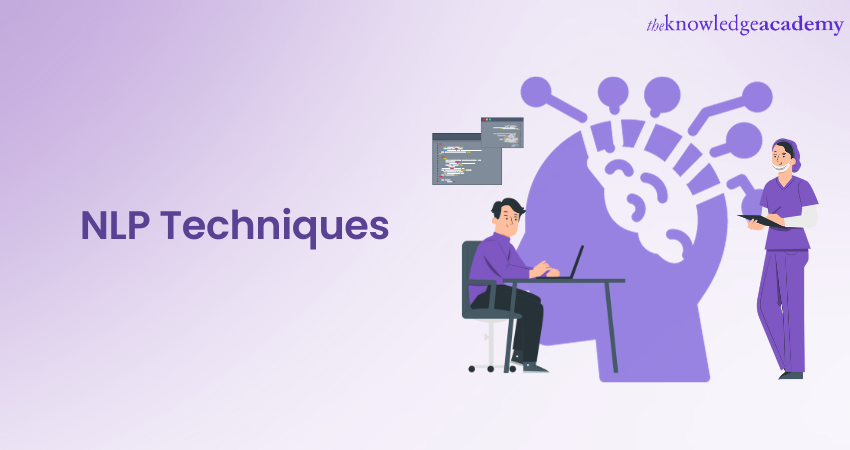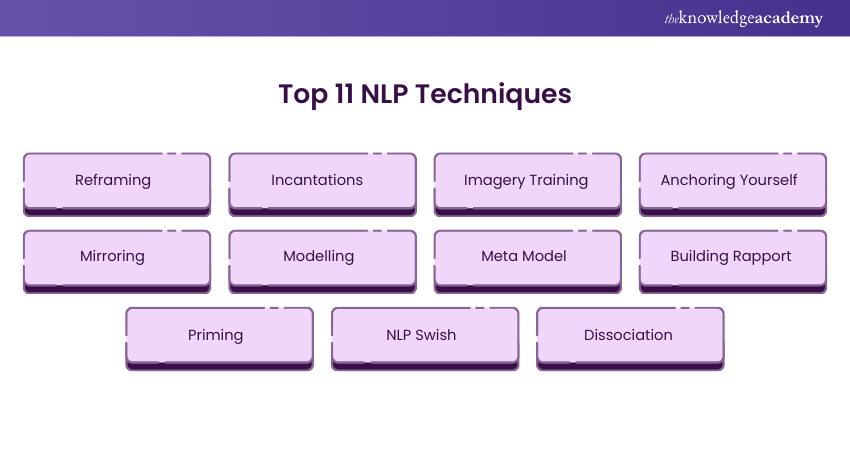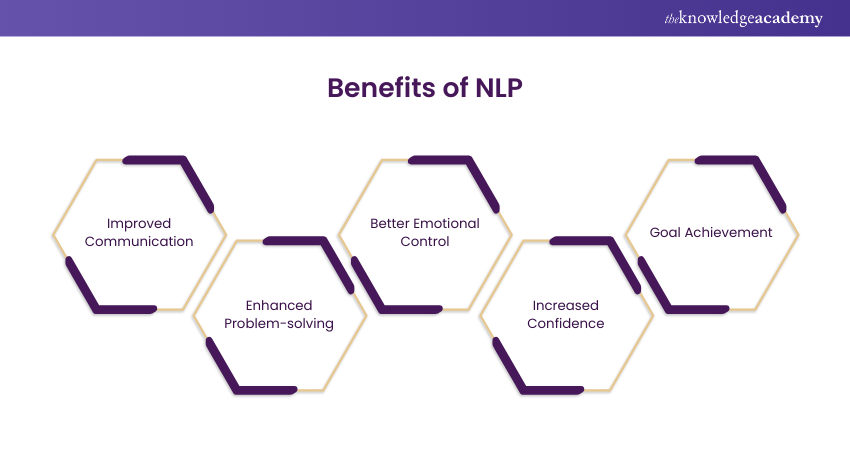We may not have the course you’re looking for. If you enquire or give us a call on +1800812339 and speak to our training experts, we may still be able to help with your training requirements.
We ensure quality, budget-alignment, and timely delivery by our expert instructors.

Imagine sharpening your thinking, enhancing communication, and achieving your goals with finesse. That’s the magic of NLP Techniques! Whether you aspire to be a better leader, forge deeper connections, or conquer stress, these powerful NLP tools are your secret allies.
In this blog, we discuss some of the most effective NLP Techniques and how you can use them to boost your personal and professional growth. Ready to transform your mindset? Let’s dive in!
Table of Content
1) What is an NLP Technique?
2) Top 11 NLP Techniques
a) Reframing
b) Incantations
c) Imagery Training
d) Anchoring Yourself
e) Mirroring
f) Modelling
g) Building Rapport
h) Priming
i) NLP Swish
j) Meta Model
3) Conclusion
What is an NLP Technique?
Neuro-Linguistic Programming (NLP)Techniques are used to either aid a person in self-growth, bring desirable change, or improve communication. These methods use verbal and non-verbal cues to encourage a desired behaviour in a person.
Although the core role of NLP lies in enhancing communication, enabling change and facilitating growth, it also has other uses. Leaders frequently use them to deliver messages more efficiently to a large group. Another use of these techniques includes therapy, allowing therapists to detect underlying issues in their patients.
In organisations, leading roles often use Neuro-Linguistic Programming to encourage and motivate their teams, thus raising productivity. Additionally, the knowledge of NLP Techniques can aid Project Managers and leaders in resolving conflicts between team members. Some of them are discussed in this blog.
Top 11 NLP Techniques
Here are 11 powerful NLP Techniques that can help you improve your mindset, communication, and overall effectiveness. These methods are designed to enhance your personal and professional life by tapping into the power of your mind.

1) Reframing
Reframing is about changing how you view a situation to see it in a more positive or helpful light. It’s like putting a new frame around a picture; the picture stays the same, but it feels different.
For example, instead of seeing a mistake as a failure, you can reframe it as a learning opportunity. This technique helps you shift your mindset and reduce negative emotions. It’s useful in personal growth and overcoming challenges. By reframing your thoughts, you can find new ways to approach problems and improve your outlook on life.
2) Incantations
Incantations involve repeating positive statements or affirmations with emotion and belief. It’s a way to program your mind to adopt new beliefs and behaviours. When you say these statements out loud with energy, you’re reinforcing positive thoughts.
For example, repeating "I am confident and capable" can help you feel more self-assured. The key is to say it with conviction so your mind starts to believe it. Incantations can boost your confidence, motivation, and overall mindset.
3) Imagery Training
Imagery training is about using your imagination to visualise success and positive outcomes. It’s like playing a mental movie where you see yourself achieving your goals. This technique helps your brain prepare for real-life situations by mentally rehearsing them.
For example, if you have a big presentation, you can visualise yourself speaking confidently and receiving positive feedback. The more vivid and detailed your imagery, the more effective it is. Imagery training can enhance your performance and reduce anxiety.
4) Anchoring Yourself
Anchoring is a technique where you create a mental trigger to access a specific feeling or state of mind. It’s like having a button you can press to instantly feel confident, calm, or motivated.
For example, if you touch your thumb and forefinger together while feeling confident, you can use that gesture later to bring back that feeling. Over time, this trigger becomes stronger and more effective. Anchoring helps you manage your emotions and stay in control in challenging situations. It’s a powerful tool for enhancing your emotional resilience.
5) Mirroring
Mirroring involves subtly copying the body language, tone, or behaviour of another person. It’s a way to build rapport and make the other person feel understood and comfortable.
For example, if someone crosses their arms, you might cross yours a moment later. The key is to be subtle and natural, so it doesn’t feel forced. Mirroring helps create a connection and can make conversations flow more smoothly. It’s a useful technique in both personal and professional interactions.
6) Modelling
Modelling is about learning from others by observing and imitating their successful behaviours. It’s like finding a role model and following their example to achieve similar results.
For example, if you admire someone’s public speaking skills, you can study how they speak and practice those techniques yourself. By modelling their behaviour, you can develop new skills and improve your performance. This technique helps you fast-track your learning by adopting proven strategies. It’s a powerful way to grow and achieve your goals.
7) Meta Model
The Meta Model is a set of questions designed to uncover the deeper meaning behind someone’s words. It’s like digging beneath the surface to understand what’s really going on in someone’s mind.
For example, if someone says, "I always fail," you might ask, "What specifically do you fail at?" This helps clarify vague statements and challenge limiting beliefs. The Meta Model is a tool for improving communication and solving misunderstandings. It helps people express themselves more clearly and think more critically.
8) Building Rapport
Building rapport is about creating a connection and a sense of trust with another person. It’s like finding common ground where both people feel comfortable and understood. You can build rapport by showing genuine interest, listening actively, and being empathetic.
When rapport is strong, communication becomes easier and more effective. It’s an essential skill in relationships, whether personal or professional. Building rapport helps you influence others and create positive interactions.
9) Priming
Priming involves preparing your mind for a specific outcome or experience by focusing on certain thoughts or images beforehand. It’s like setting the stage for your brain to respond in a particular way.
For example, if you prime yourself by thinking about confidence before a meeting, you’re more likely to feel and act confidently. This technique helps you steer your thoughts and behaviours in the desired direction. Priming is a powerful way to shape your mindset and improve your reactions.
Learn to enhance rapport-building skills with our Introduction to NLP Course – Join today!
10) NLP Swish
The NLP Swish technique is used to replace negative thoughts or habits with positive ones. It involves visualising the unwanted behaviour and then quickly “swishing” to an image of the desired behaviour.
For example, if you want to stop procrastinating, you might picture yourself procrastinating and then immediately switch to a vivid image of yourself being productive. This quick mental shift helps reprogram your brain to favour positive behaviour. The Swish technique is effective for breaking bad habits and creating new, healthier ones.
11) Dissociation
Dissociation is a technique used to detach yourself from negative emotions or experiences. It’s like stepping outside of yourself and viewing the situation from a distance.
For example, if you’re feeling overwhelmed by a stressful event, you can imagine watching it as if it were a movie. This distance helps reduce the emotional impact and gives you a clearer perspective. Dissociation is useful for managing intense emotions and gaining control over your reactions. It’s a helpful tool for coping with challenging situations.
Benefits of NLP
Here are five key benefits of NLP:

a) Improved Communication: NLP enhances your ability to understand and connect with others, making interactions smoother and more effective. This leads to stronger relationships in both personal and professional settings.
b) Enhanced Problem-solving: It helps you shift your perspective, allowing you to tackle challenges with a creative and open mind. This makes finding solutions quicker and easier.
c) Better Emotional Control: With NLP Techniques, you can manage stress, anxiety, and other emotions more effectively. This results in a calmer, more focused approach to daily life.
d) Increased Confidence: It helps reframe negative thoughts, boosting your self-esteem and confidence. This empowers you to take on challenges with a positive mindset.
e) Goal Achievement: NLP provides practical tools for setting clear goals and staying motivated. This makes it easier to reach your objectives and achieve success in various areas of your life.
Understand the practical applications of NLP with our NLP Foundation and Practitioner Training – Join today
Conclusion
As you delve into NLP Techniques, remember that your mind is a treasure trove waiting to be unlocked. Embrace these tools, practice them diligently, and witness the transformation—both within yourself and in your interactions with the world. Whether you’re navigating leadership challenges, nurturing connections, or simply seeking growth, NLP empowers you. So go forth, my friend, and weave magic with your words and thoughts!
Learn about powerful communication techniques with our Neuro Linguistic Programming Course – Sign up today!
Frequently Asked Questions
Can NLP Techniques be Used to Enhance Public Speaking Skills?

Yes, NLP Techniques can boost your confidence and reduce nervousness when speaking in public. They help you connect with your audience and deliver your message more effectively.
How do NLP Strategies Enhance Leadership and Team Dynamics?

NLP strategies help leaders communicate clearly and build trust within their teams. They improve understanding, foster collaboration, and create a positive work environment.
What are the Other Resources and Offers Provided by The Knowledge Academy?

The Knowledge Academy takes global learning to new heights, offering over 3,000 online courses across 490+ locations in 190+ countries. This expansive reach ensures accessibility and convenience for learners worldwide.
Alongside our diverse Online Course Catalogue, encompassing 19 major categories, we go the extra mile by providing a plethora of free educational Online Resources like News updates, Blogs, videos, webinars, and interview questions. Tailoring learning experiences further, professionals can maximise value with customisable Course Bundles of TKA.
What is The Knowledge Pass, and How Does it Work?

The Knowledge Academy’s Knowledge Pass, a prepaid voucher, adds another layer of flexibility, allowing course bookings over a 12-month period. Join us on a journey where education knows no bounds.
What are Related Courses and Blogs Provided by The Knowledge Academy?

The Knowledge Academy offers various NLP Training, including the Introduction to NLP Course, NLP Foundation and Practitioner Training, and Neuro-Linguistic Programming Course. These courses cater to different skill levels, providing comprehensive insights into NLP Dissociation Techniques.
Our Business Skills Blogs cover a range of topics related to NLP, offering valuable resources, best practices, and industry insights. Whether you are a beginner or looking to advance your Neuro-Linguistic Programming knowledge, The Knowledge Academy's diverse courses and informative blogs have got you covered.
Upcoming Business Skills Resources Batches & Dates
Date
 Neuro Linguistic Programming
Neuro Linguistic Programming
Fri 18th Jul 2025
Fri 21st Nov 2025
Fri 27th Feb 2026
Fri 1st May 2026
Fri 19th Jun 2026
Fri 28th Aug 2026
Fri 18th Dec 2026






 Top Rated Course
Top Rated Course



 If you wish to make any changes to your course, please
If you wish to make any changes to your course, please


